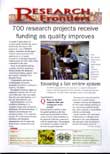A chemical
extracted from the Thunder God vine, a plant used in traditional Chinese
medicine for hundreds of years, is being investigated by Hong Kong researchers
as a potential treatment for rheumatoid arthritis. Test tube studies so
far have shown that the vine chemical, triptolide, suppresses the abnormal
growth of immune cells that cause the painful disease in human joints.
 Rheumatoid arthritis
develops from the knock-on effect of the overactive immune cells, resulting
in the inflammation and overgrowth of synovial cells which line the joints.
Particularly susceptible are joints in the hands, feet, wrists, elbows,
ankles and knees, but almost all joints can be affected. Rheumatoid arthritis
develops from the knock-on effect of the overactive immune cells, resulting
in the inflammation and overgrowth of synovial cells which line the joints.
Particularly susceptible are joints in the hands, feet, wrists, elbows,
ankles and knees, but almost all joints can be affected.
 The Thunder
God vine, Trypterygium Wilfordii hook F, which grows in the southern part
of China, has been used as a herbal treatment to combat rheumatoid arthritis
for centuries. Its effectiveness, however, is offset by toxicity side effects
which include hair loss, diarrhoea, bone marrow suppression and infertility. The Thunder
God vine, Trypterygium Wilfordii hook F, which grows in the southern part
of China, has been used as a herbal treatment to combat rheumatoid arthritis
for centuries. Its effectiveness, however, is offset by toxicity side effects
which include hair loss, diarrhoea, bone marrow suppression and infertility.
 Triptolide,
extracted from the vine, accounts for most of the therapeutic actions of
the herbal treatment. Using special chemical assays, researchers at The
University of Hong Kong under Prof C S Lau and Dr Dan Yang have dissected
the structure of triptolide to evaluate how it produces its various biochemical
and cytotoxic effects. When tested in an in vitro system, triptolide was
found to suppress the overactive immune cells leading rheumatoid arthritis,
and inhibit the growth and proliferation of damaging T-cells, a kind of
lymphocyte which circulates in the blood. Triptolide,
extracted from the vine, accounts for most of the therapeutic actions of
the herbal treatment. Using special chemical assays, researchers at The
University of Hong Kong under Prof C S Lau and Dr Dan Yang have dissected
the structure of triptolide to evaluate how it produces its various biochemical
and cytotoxic effects. When tested in an in vitro system, triptolide was
found to suppress the overactive immune cells leading rheumatoid arthritis,
and inhibit the growth and proliferation of damaging T-cells, a kind of
lymphocyte which circulates in the blood.
 Triptolide was
also found to inhibit active T-lymphocytes which are capable of secreting
chemicals known as cytokines that can activate other immune cells as well
as the synovial cells. Prof Lau said: "The action of tripolide does
not appear to be related to the direct killing of the damaging cells but
rather to induce their apoptosis, a kind of natural programmed cell death." Triptolide was
also found to inhibit active T-lymphocytes which are capable of secreting
chemicals known as cytokines that can activate other immune cells as well
as the synovial cells. Prof Lau said: "The action of tripolide does
not appear to be related to the direct killing of the damaging cells but
rather to induce their apoptosis, a kind of natural programmed cell death."
 The normal function
of the joint lining, or synovium, is to secrete small amounts of fluid which
act as a lubricant as well as providing essential nutrients. A healthy synovium
is very thin, composed of only one or two layers of cells. In rheumatoid
arthritis sufferers, however, inflamed synovial cells become aggressive
and invade surrounding tissues leading to joint damage. The normal function
of the joint lining, or synovium, is to secrete small amounts of fluid which
act as a lubricant as well as providing essential nutrients. A healthy synovium
is very thin, composed of only one or two layers of cells. In rheumatoid
arthritis sufferers, however, inflamed synovial cells become aggressive
and invade surrounding tissues leading to joint damage.
 More than 60
different triptolide-based compounds have been tested by Prof Lau's team
so far. Clinical tests have yet to take place. The underlying cause of rheumatoid
arthritis is not fully understood and there is no cure for the disease.
Middle aged people are the most common victims with the peak age of onset
between 35 and 55. More than 60
different triptolide-based compounds have been tested by Prof Lau's team
so far. Clinical tests have yet to take place. The underlying cause of rheumatoid
arthritis is not fully understood and there is no cure for the disease.
Middle aged people are the most common victims with the peak age of onset
between 35 and 55.
 Females appear
to be more susceptible to the disease than males by a ratio of about three
to one. In Western countries, about 1 per cent of populations have the disease.
In Hong Kong, an estimated 0.4 per cent of the population is affected. Females appear
to be more susceptible to the disease than males by a ratio of about three
to one. In Western countries, about 1 per cent of populations have the disease.
In Hong Kong, an estimated 0.4 per cent of the population is affected. |




